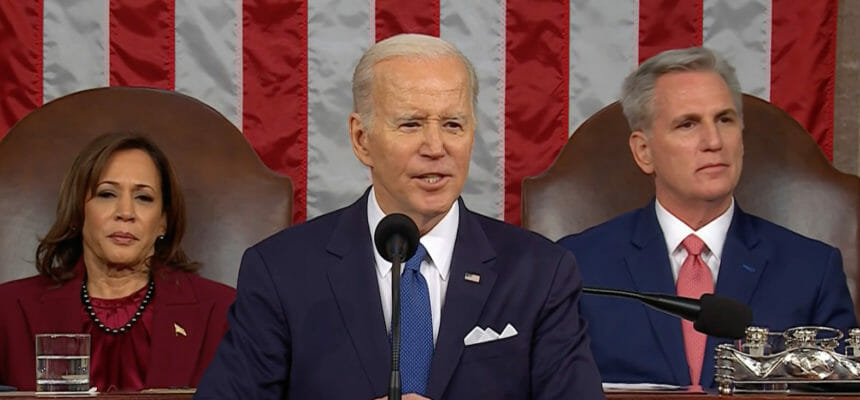
It was not as expansive as in the State of the Union Address a year ago, but nursing homes once again elicited an ignominious mention in President Joe Biden’s second SOTU address Tuesday night.
In addition, the White House indicated Monday more pressure on providers will soon be coming.
“We’re protecting seniors’ life savings by cracking down on nursing homes that commit fraud, endanger patient safety and prescribe drugs that are not needed,” Biden trumpeted during the SOTU.
The 12-second mention was in direct reference to the administration’s Jan. 18 announcement that the Centers for Medicare & Medicaid Services would be starting targeted audits to determine whether providers are properly assessing and coding patients with a schizophrenia diagnosis. The agency also announced at that time that it will begin publicly displaying disputed survey citations even before their merit is proven or disproven.
Tuesday night’s nursing homes reference was preceded by a lengthy section touting defense of Social Security and Medicare funds, during which the president elicited a unified ovation to “stand up for seniors.” Immediately after the mention, he touted success in enabling seniors to now be able to get hearing aids over the counter.
The nursing home declaration Tuesday came 36 minutes into a 73-minute speech before a joint gathering of Congress, Supreme Court justices, military leaders and other top federal figures.
In his 2022 State of the Union, the then-79-year-old commander in chief was more explicit about his intention to hold certain elements of the long-term care sector to account.
“Medicare is going to set higher standards for nursing homes and make sure your loved ones get the care they deserve and that they inspect and will get looked at closely,” he said then, after also promising more accountability of “Wall Street” firms that take over facilities and allegedly don’t keep quality standards high enough.
At the time, the 19-second SOTU passage was believed to be the most extensive mention of nursing homes ever in a State of the Union. It came March 1, 2022, a day after the White House released an expansive 21-point reform plan that remains a work in progress.
The centerpiece of the reform effort is a promised first-ever nursing home staffing mandate. A detailed proposal, feared by many nursing home operators already struggling with historic staffing struggles, may be released at any time. Two weeks ago, an administration official announced that a study encompassing provider interviews and projected cost implications was done and strategies were being considered.
Biden’s 2023 SOTU nursing homes utterance was hardly as controversial as the one a year earlier. All administrations are duty-bound to crack down on fraudulent activities conducted by nursing home operators, as well as any committed by other healthcare and non-healthcare entities that accept federal funding.
This administration, however, has made its intention to focus on inappropriate long-term care caregiving and business practices much better known than its predecessors.’ In addition to several high-profile regulatory actions announced by CMS over the last year, the Department of Justice on Tuesday announced that a record $2.2 billion had been recovered via False Claims Act involving nursing homes, and many others.
The White House directly indicated in a new White House Fact Sheet section labeled “Improving safety and accountability in nursing homes” that more regulatory belt-tightening will be coming for nursing homes.
“As the President directed in last year’s State of the Union, CMS has taken action to strengthen oversight of the worst performing nursing homes, prevent abuse and Medicare fraud, and improve families’ ability to comparison shop across nursing homes,” the notice said. “In the coming days and months, CMS will announce new actions to increase safety and accountability at nursing homes.”
On Tuesday night, Biden also urged lawmakers to adopt his upcoming budget plan to pay for more services for seniors in their homes.
“Pass my plan so we get seniors and people with disabilities the home care and services they need, and support the workers who are doing God’s work,” he implored the lawmakers seated before him. “These plans are fully paid for and we can afford to do them.”




